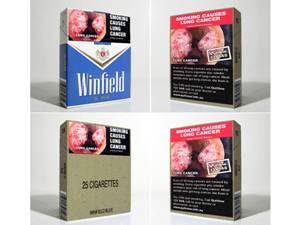 Last updated: April 30, 2010
Last updated: April 30, 2010
Source: Associated Press in Sydney via South China Morning Post
Canberra has announced a pioneering plan to force tobacco firms to sell cigarettes in generic packaging devoid of company logos.
The legislation, introduced yesterday, would take effect on July 1, 2012. It must be approved by both houses of Parliament.
Instead of logos, promotional text or colourful images on cigarette packets, graphic government health warnings would be prominently displayed instead. The brand name would be relegated to tiny, uniform type at the bottom.
“The new branding for cigarettes will be the most hardline regime in the world, and cigarette companies will hate it,” Prime Minister Kevin Rudd said.
The government also announced an increase in cigarette tax of 25 per cent, driving up the price of a pack of 30 cigarettes by about A$2.16 (HK$15.46) to around A$16.70. The tax comes into effect today.
“The big tobacco companies are going to go out there and whinge, whine, complain, consider every kind of legal action known to man – that’s par for the course,” Rudd said. “We, the government, will not be intimidated by any big tobacco company.”
As predicted, tobacco companies immediately blasted the packaging crackdown and vowed to fight it in court.
“Introducing plain packaging just takes away the ability of a consumer to identify our brand from another brand, and that’s of value to us,” Imperial Tobacco Australia spokeswoman Cathie Keogh told ABC radio.
The company planned to take legal action, she said.
Retailers said the tax increase would hurt their businesses and bolster the black market for cigarettes.
“It’s a lazy policy response being pushed by some health advocates,” Mick Daly, national chairman of Australian supermarket chain IGA, said. “That amounts to a direct attack on approximately 16 per cent of Australians who have made legal and legitimate lifestyle choices.”
Tim Wilson, director of intellectual property and free trade at Australia’s Institute of Public Affairs, said taxpayers could end up paying around A$3 billion a year in compensation to tobacco companies.
“Under Australia’s constitution, if the government basically takes someone’s property rights – including intellectual property such as trademarks – or devalues them to a significant extent, they have to provide compensation,” Wilson said.
“I’d be shocked if [tobacco companies] didn’t [pursue compensation], because if it happens here, it’ll happen all over the world,” he said.
Opposition leader Tony Abbott dismissed the tax increase as a cash grab, and said he wanted evidence that changing the packaging would reduce smoking. “I’m not in the business of defending smoking, I want to make that absolutely clear. But I also want to make absolutely clear that this is not a health policy – this is a tax grab,” Abbott said.
Australia has banned tobacco ads from print, television and radio for years. The new proposal would also restrict internet advertising.
Stripping packets of their logos would effectively stamp out tobacco companies’ marketing campaigns, said Professor Rob Moodie, chairman of the government’s National Preventative Health Task Force, which recommended the legislation.
“The thing that tobacco companies fear second after price increases is plain packaging because it takes away their last real avenue for branding their cigarettes,” Moodie said. “It also takes away their in-store presence.”
The number of Australians who smoke has more than halved in the past 20 years, the Organisation for Economic Co-operation and Development said in a report in December. About 16.6 per cent of Australians smoke daily, the third-lowest rate in the developed world behind Sweden and the US, according to the report.
New cases of lung cancer fell to 60.6 per 100,000 men in 2006 from 80.6 per 100,000 two decades earlier, according to the Australian Institute of Health and Welfare in Canberra. But the incidence in women jumped 46 per cent to 30.3 per 100,000.
Additional reporting by Bloomberg


